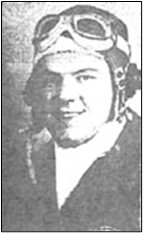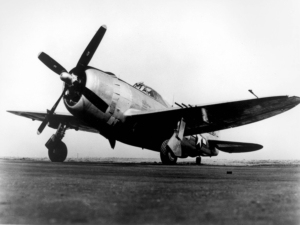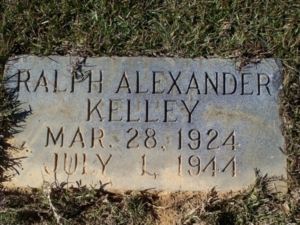Scroll of Honor – Ralph Alexander Kelley
Thunderbolt Pilot
Written by: Kelly Durham
Ralph Alexander Kelley of Charlotte, North Carolina enrolled at Clemson College as a member of the Class of 1946 and  attended school during the 1942-43 academic year. When the term came to a close in the spring of 1943, Clemson’s campus transitioned into Army training facilities under the direction of the War Department. Underclassmen like Kelley were scattered across the country, ordered to attend basic training. Those who demonstrated aptitude could apply for officer candidate schools. This is likely the path that Kelley took on his way to becoming an Army Air Force fighter pilot.
attended school during the 1942-43 academic year. When the term came to a close in the spring of 1943, Clemson’s campus transitioned into Army training facilities under the direction of the War Department. Underclassmen like Kelley were scattered across the country, ordered to attend basic training. Those who demonstrated aptitude could apply for officer candidate schools. This is likely the path that Kelley took on his way to becoming an Army Air Force fighter pilot.
Following flight training, Kelley shipped overseas and was assigned to the 522nd Fighter Squadron of the 27th Fighter Group. In June 1944, the group transitioned from the older, slower P-40 Warhawk fighter to the faster and more heavily armed P-47 Thunderbolt.
 The P-47 had gotten off to a rocky start. Fighter pilots used to the sleek design of their streamlined aircraft initially balked at this huge, new fighter. Its wingspan was five feet wider and it possessed nearly four times the fuselage volume of the vaunted Spitfire. It was the heaviest single-engine, one-man aircraft of the World War II, weighing as much as eight tons when fully loaded with fuel and armaments. The fighter’s conventional landing gear meant that visibility on the ground was difficult as the pilot had to maneuver the airplane from side-to-side in order to see around the big radial engine encased in its massive nose. As first fielded, the Thunderbolt’s climb performance was disappointing, but in actual combat, its pilots soon came to trust its speed in a dive and its rugged durability. By mid-1944, the P-47 was well-established as both a capable escort for heavy bomber formations and an effective ground attack aircraft. From airfields in Corsica, Kelley’s squadron flew P-47 missions to attack German communications and supply routes in northern Italy.
The P-47 had gotten off to a rocky start. Fighter pilots used to the sleek design of their streamlined aircraft initially balked at this huge, new fighter. Its wingspan was five feet wider and it possessed nearly four times the fuselage volume of the vaunted Spitfire. It was the heaviest single-engine, one-man aircraft of the World War II, weighing as much as eight tons when fully loaded with fuel and armaments. The fighter’s conventional landing gear meant that visibility on the ground was difficult as the pilot had to maneuver the airplane from side-to-side in order to see around the big radial engine encased in its massive nose. As first fielded, the Thunderbolt’s climb performance was disappointing, but in actual combat, its pilots soon came to trust its speed in a dive and its rugged durability. By mid-1944, the P-47 was well-established as both a capable escort for heavy bomber formations and an effective ground attack aircraft. From airfields in Corsica, Kelley’s squadron flew P-47 missions to attack German communications and supply routes in northern Italy.
After a long, costly campaign through the winter and spring, Rome was finally liberated on June 5, 1944. On July 1, Kelley was killed at the beginning of a mission when his aircraft likely collided with another P-47 on the ground at some point during his  take off acceleration.
take off acceleration.
Kelley was awarded the Purple Heart and the Air Medal. He is buried at Hamor Creek Baptist Church Cemetery in Mount Gilead, North Carolina.
For more information on Second Lieutenant Ralph Alexander Kelley see:
https://soh.alumni.clemson.edu/scroll/ralph-alexander-kelley/
For additional information on Clemson University’s Scroll of Honor visit:
https://soh.alumni.clemson.edu/
